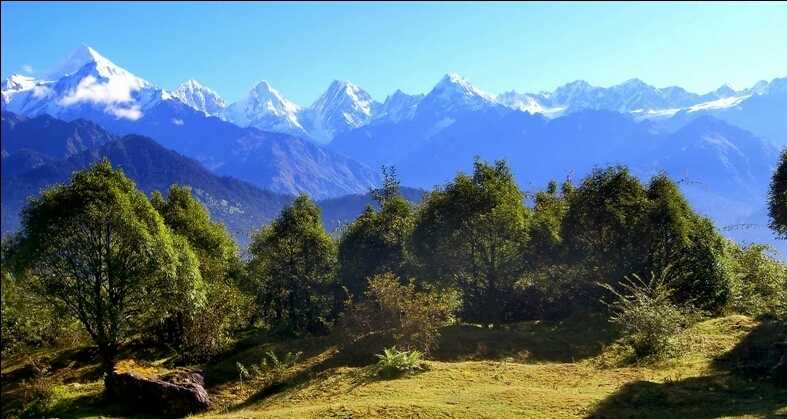
My love for the wonderful places in Uttarakhand never fails to get over. This petite state has so much to offer, that it is hard to fall for just one place. In my trysts with Uttarakhand, I have travelled far and wide, and have managed to fall for every little town or village, which I had the pleasure of visiting.
One such place that took my heart away is Munsiyari. It is situated about 595 km from Delhi and is a quaint town in Uttarakhand. This place is extremely famous for its treks, due to the terrific beauty that this town has.
Munsiyari is said to be inhabited by the original natives of the Himalayan highlands. The local culture is rich, and this town becomes a base for several treks like- Milam, Rilam, and Nanda Devi.
Like a lot of towns in Uttarakhand, Munsiyari also boasts of splendid views of the resplendent Himalayas. Your heart will be filled with joy as you gaze at the dreamy Himalayan mountains that stand proudly at a distance.
This was one of the first things that I did when I reached Munsiyari. My hotel room offered a great view of the mountains, and I spent a lot of time just admiring this creation of nature.
This lovely valley is a home to loads of glacial treks that offers splendid views. The treks are right through the lap of nature.
The lovely valley is decorated with various colourful trees and flowers, that spread over this place like a well ornate carpet.
As my car entered the town of Munsiyari, my trusted driver told me how this was supposedly the place from where the Pandavas had commenced on their journey to the heavens.
I had opted for a car ride from Delhi to reach this town. The whole route was filled with scenic viewpoints as the fog started descending upon us. The road does wind into a dangerous incline after THAL, and one must be careful while driving through that stretch.
After enjoying the views of the Himalayan range, I decided to visit the regal Birthi Fall. I had heard a lot about these falls, and how it has the power to captivate anyone even at first glance.
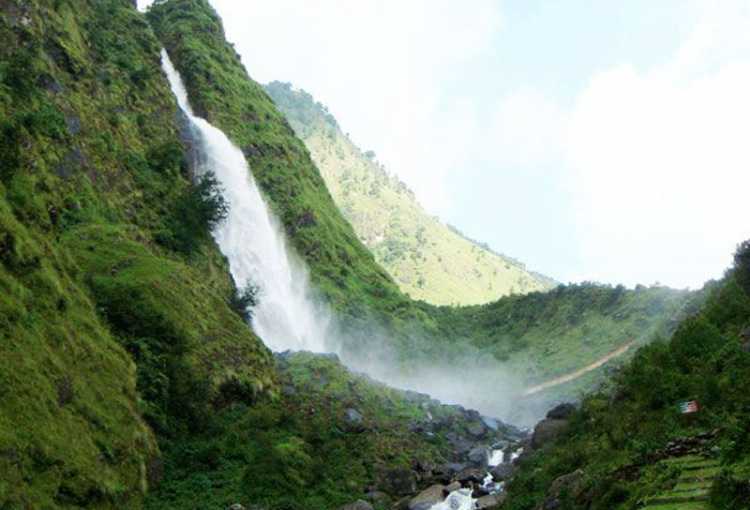
But, the journey to these falls is not easy- but then again- anything that is good doesn’t come easy. With that motivation in my mind, I and my trusted driver headed off to the Birthi mountains. These mountains are absurdly precarious. It is extremely prone to erosion and landslides, and the edges of the mountain are absolutely scary with deep gorges that lead straight to the abyss. Many cars or other vehicles have met with accidents in this route. So one has to be extremely cautious while driving here.
My heart was in my mouth throughout the entire journey. But, my trusted driver ensured me that I was in safe hands.
To reach the falls, one has to climb 500 stairs, while that can exhausting, the sound of the falls was enough to keep me motivated.
As I was climbing, I could see the majestic falls and I could hear the sound of the gushing water. There are benches to rest, but I was determined to reach the falls as quickly as possible.
Finally, when I reached at the 125 foot above sea level summit, the entire area seemed to be lost to me. My eyes were entirely focused on the milky white foamy water and everything else was just fading behind. The gushing water was so magnificent that one could not look away. It has the power to demand your attention and retain it.
I had to eventually pull myself away from this beauty so that I could continue onto my journey.
After this rejuvenating trek, I headed back to Munsiyari to call it a day.
The next morning, I headed off to trek to the Milam glacier. This scenic trek starts from Bog Udyar.
The Milam glacier can be called the umbrella glacier, under which many smaller glaciers have all come and merged into one. Glaciers from different peaks have made their way here and blended at the Milam Glacier.

This trek is a long one, and it took me 15 days to finally reach the top. The whole trek is painted with stunning views of the peaks, and I had to pass through some refreshing yet charming jungles. As I was passing through these forests, I could almost hear the trees whispering me and calling out to me, as if motivating me to stay on my path. The whole experience is breathtaking and very personal to anyone who takes this trek.
One has to be well adjusted to higher altitudes, otherwise one is sure to experience some breathing issues. This glacier is also the biggest source for the Goriganga river.
The route of the trek is as follows – Railkot Village (3130 m)- Panchu And Milam Villages (3240 m)- Nitwal Thaur- Suraj Kund.
The Nitwal Thaur to Suraj Kund route is absolutely stunning, all you can see the wonderful Trishul massif.
I came back to my hotel room late evening, as I spent some time roaming around the locals’ areas, trying to gather more stories about their history in Munisiyari.
Next day after having a hot delicious breakfast, I made my way to the popular Khulia Top Trek. This was touted to be the highlight of my trip, and I was eagerly looking forward to it.

The trek commences from the Balati bench, which is about 8 km from Munsiyari town.
The trek is merely 5 km and takes about two hours one way. The entire trek is nestled in a wonderful magical pathway, and I had an absolute blast while trekking to the top.
It is said that the views from the peak are at its best during sunrise, but I decided not to opt for that.
As I started my trek, I noticed how the road takes a beautiful turn towards the dense oak forests, which are lightly decorated by the alluring Rhododendron trees. The latter parts of the trek involve crossing two lovely ridges, which took me to the vast green meadow of Khuliya. This was of a place where I decided to stretch my legs and rest. Throughout the trek, I could see the mighty Panchachuli and Rajrambha peaks, which served as a beautiful backdrop.
As I finally reached the top, I was absolutely gobsmacked by the scene that unfolded in front of me. The view is stunning, as you can get a complete 360-degree view of the great Himalayas. From here you can see the formidable Nanda Kot and Nanda Devi Peaks. The lovely valleys of Sunderdhunga and Milam spread under these huge peaks as if seeking blessings of these divine mountains.
My last destination during this trip was the fascinating and unique Patal Bhuvaneshwar. This mystical cave is actually a temple and it is located at a village called Bhuvaneshwar. Legends and locals believe that this face is dedicated to Lord Shiva and the 33 crore Gods in the Hindu religion. This wonderful limestone cave is about 90 feet deep, which makes it pretty scary.

When I managed to enter the cave through a poorly lit and dangerous pathway, I was mesmerised to see the beautiful stalactite and stalagmite formations, that took on various shades and shapes, and added another dimension to this cave temple.
The cave is illuminated through electricity and has a number of caves within itself. There are several tunnels like openings that lead to various caves, and all I could think were those cartoons where the characters had to choose one tunnel, and somehow managed to come back to the start.
The cave has a lot of religious connotations, as many believe that some of the openings of the cave lead to the four abodes (Char Dham)
The naturally occurring structures are especially very beautiful to look at. These structures were created after a volcanic eruption, that led to the formation of molten rocks, iron, copper, and zinc.
I had hired a guide for this excursion since I wanted to understand the history behind this cave temple in a better way.
The naturally made structures have taken various shapes- like that of a peacock, snake or even a cow. There is one model which resembles Amarnath.

Eventually, I reached the main Shiva Linga. The locals and the pilgrims believe that this particular linga has so much power, that one gets whatever they wish for, after worshipping here.
There are several myths and stories that revolve around this place, but the spiritual energy that was impossible to miss.
Above the Shivalinga, there were idols of Vishnu and Brahma. Water was continuously falling over the linga and Vishnu’s idol, but interestingly the idol of Brahma was devoid of this dripping water. Even my guide failed to explain this phenomenon.
Another unique feature of this cave is that there is water leaking and dripping from every nook and corner of this cave. Yet, no one was collecting or recycling this water. Somehow the water was being drained almost as instantly as it was dripping. But the sounds of the dripping water fills the void cave with a new life. The cave was also somehow well ventilated, and not once did I face any trouble with my breathing.
With this, my journey to this heavenly abode came to an end. As I got into my car and passed the lush meadows of Munsiyari, I couldn’t help but yearn to go back and stare at the majestic Himalayan peaks. I wanted to do all of the treks again, and let my heart soar at the meadows of Munsiyari. But, everything that is good must come to end, to make space for better things to come.
So with the memory of the gorgeous treks and towns in my mind, I bid farewell to the paradisiacal town of Munsiyari.

10 Top Pollution-Free Places in India Worth Visiting
27 Feb 2026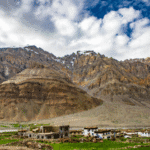
12 Best Places for a Honeymoon in Himachal Pradesh and Uttarakhand
26 Feb 2026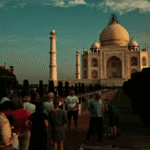
11 Places Every American Tourist Should Visit in India
25 Feb 2026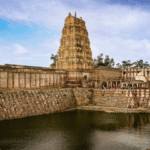
10 Best Famous Temples to Visit in Karnataka
24 Feb 2026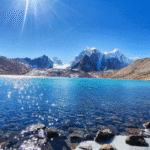
13 Top Things to Do in Sikkim for an Eventful Holiday
24 Feb 2026